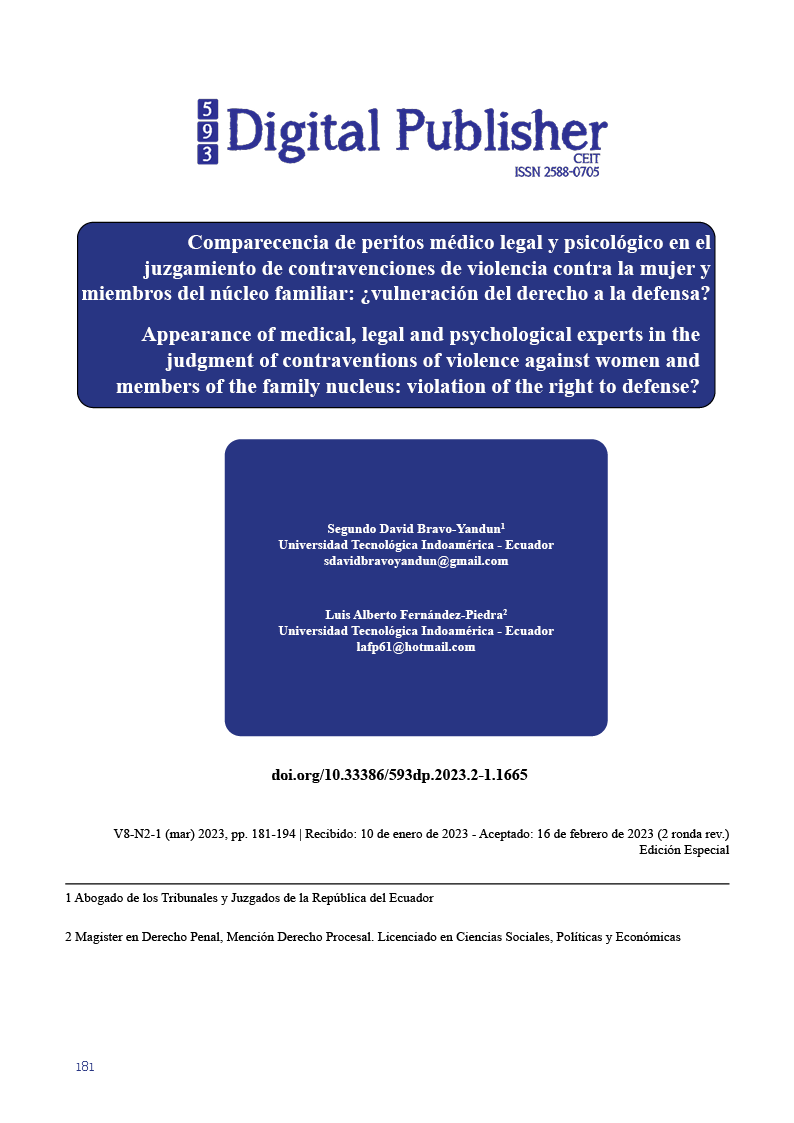Appearance of medical, legal and psychological experts in the judgment of contraventions of violence against women and members of the family nucleus: violation of the right to de-fense?
Main Article Content
Abstract
This article deals with the violation of the right to due process, in terms of the basic guarantee of the right to defense; and, legal certainty, because, by express mandate of what is stipulated in article 643, number 15, of the Comprehensive Criminal Organic Code, it does not oblige the professionals (experts) of the technical offices of the courts of violence against the woman and the family to appear at the Judgment Hearing to support their reports, but rather, they are only annexed to the process and are valued by the judge. This refusal to appear, entails the violation of the right to defense, since it makes it impossible to practice and contradict the evidence within the trial hearing, which is why the main objective of study of this article , is the analysis of the theoretical-practical postulates of the right to defense and the contradiction of the evidence, allowing to determine if the absence of the experts in the trial is transcendental, in terms of the right to defense of the prosecuted persons. The research method used is analytical, within which, through the study of a specific case (practical case) and interviews, it allows us to legally analyze the topic addressed.
Downloads
Article Details

This work is licensed under a Creative Commons Attribution-NonCommercial-ShareAlike 4.0 International License.
1. Derechos de autor
Las obras que se publican en 593 Digital Publisher CEIT están sujetas a los siguientes términos:
1.1. 593 Digital Publisher CEIT, conserva los derechos patrimoniales (copyright) de las obras publicadas, favorece y permite la reutilización de las mismas bajo la licencia Licencia Creative Commons 4.0 de Reconocimiento-NoComercial-CompartirIgual 4.0, por lo cual se pueden copiar, usar, difundir, transmitir y exponer públicamente, siempre que:
1.1.a. Se cite la autoría y fuente original de su publicación (revista, editorial, URL).
1.1.b. No se usen para fines comerciales u onerosos.
1.1.c. Se mencione la existencia y especificaciones de esta licencia de uso.
References
Corte Constitucional del Ecuador. (02 de junio de 2021). Sentencia No. 363-15-EP/21. Obtenido de Corte Constitucional del Ecuador: https://www.corteconstitucional.gob.ec/
Corte Constitucional del Ecuador. (24 de agosto del 2010). Sentencia Nro. 035-10-sep-CC. Obtenido de Corte Constitucional del Ecuador: https://www.corteconstitucional.gob.ec/
Corte Constitucional del Ecuador. (10 de marzo de 2021). Sentencia No. 433-16-EP/21. Obtenido de Corte Constitucional del Ecuador: https://www.corteconstitucional.gob.ec/
Zabala, J. (2002). El debido proceso. editorial, EDINO; Guayaquil-Ecuador.
Convención Americana de Derechos Humanos. (22 de noviembre de 1969). Obtenido de la Corte Interamericana de Derechos Humanos CIDH: https:// https://www.corteidh.or.cr/tablas/17229a.pdf
Unidad Judicial Multicompetente del Canton La Concordia, Provincia de Santo Domingo de los Tsachilas, (30 de junio de 2021) sentencia de la causa No. 23303-2021-00640. Obtenida del Archivo de la Unidad Judicial Multicompetente del Cantón La Concordia, Provincia de Santo Domingo de los Tsachilas.
Constitución de la República del Ecuador (20 de octubre del 2008). Registro Oficial 449.
Código Orgánico Integral Penal (10 de febrero de 2014). Registro Oficial No. 180.



